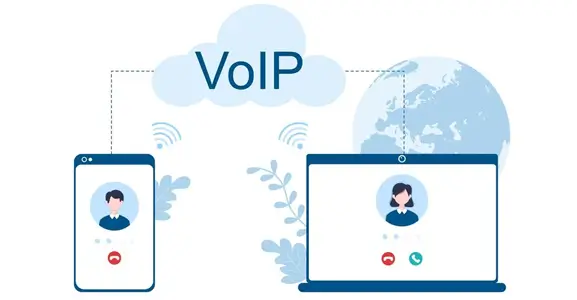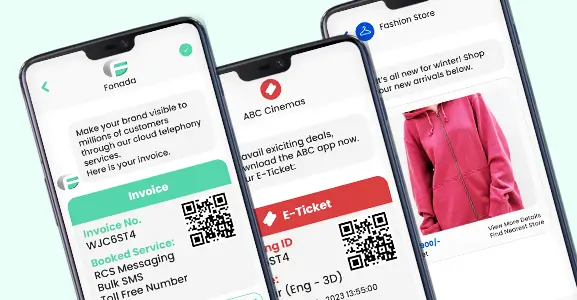The business environment constantly evolves due to technological advancements, customer requirements, and remote workforces. Maintaining connectivity is critical; fortunately, businesses have access to a wide range of tools to assist them in achieving this objective. The multitude of Voice over Internet Protocol(VoIP) services available in the market provides businesses with a wealth of previously unavailable options.
Voice over Internet Protocol(VoIP) lets you place voice calls over the Internet by converting audio into digital data that can be transmitted almost instantaneously to its destination. As a result, it has become a popular communication method for businesses of various sizes and types. This guide will explain what VoIP is and how it works with reference to its benefits, features, cost, service provider, and utility for the business world.
What Is Voice Over Internet Protocol (VoIP)?
Definition Of VoIP
Voice over Internet Protocol(VoIP) is a virtual phone technology to make and receive phone calls with the help of Internet. VoIP means Voice over Internet Protocol technology which enables you to place phone calls using the Internet instead of relying on a traditional landline and public-switched telephone network (PSTN).
Internet telephony (IP telephony) allows you to make and receive calls from any location. Here, VoIP means that you can make and receive calls from anywhere, provided you have an internet connection, without needing PSTN.
Interestingly, you can integrate VoIP with cloud PBX technology and enable your business to manage incoming calls by routing them to the appropriate person or department. A modern VoIP phone system is a combination of VoIP and cloud PBX, eliminating the need for costly equipment and hardware, unlike traditional on-premise systems.
VoIP Functionality: How Does VoIP Work?
VoIP technology operates by converting your voice into a digital file, compressing it, and transmitting it over the Internet. The call conversation occurs via small data packets that can be transmitted globally in less than a second. The following is a four-step process:
- To initiate a VoIP call, your IP phone connects to your switch or router in your Local Area Network (LAN).
- When dialing a phone number, your IP phone signals your VoIP service provider to call the other party.
- VoIP service establishes the VoIP calling and exchanges data packets between your IP phone and the service provider.
- These digital signals are transformed back into audible sound by your VoIP phone.
When it comes to VoIP meaning, VoIP technology offers worldwide coverage wherever a broadband internet connection is available, bypassing traditional telephone companies. The need for expensive, proprietary equipment to use VoIP has diminished over time, with the use of open standards, including Session Initiation Protocol (SIP) enabling full compatibility between various desk phones, conference phones, and VoIP apps.
VoIP Phone Functionality: How Does A VoIP Phone Work?
VoIP phones use digital signals to authorize and establish phone calls through a VoIP service provider. To accomplish this, follow these steps:
- The VoIP phone “registers” itself with a VoIP service provider.
- Incoming and outgoing calls are set up and managed by the VoIP provider.
- When a call is made from a VoIP phone, the provider sets up the call over the public switched telephone network (PSTN).
- The sound is transformed and compressed into data packets by the VoIP phone’s handset and immediately transmitted to the VoIP provider while a user speaks on the phone.
- Based on the other party’s phone provider, the VoIP provider relays the data packets or transforms the sounds back into analog audio.
Even though these steps take just a few seconds to complete, the conversation takes place in real-time without delay once connected.
Comparing VoIP With Landline Phones (VoIP Vs. Landlines)
The primary distinction between VoIP and landline phones is that landline phones are connected to a physical location using copper wires. In contrast, VoIP phones operate over the Internet and are not tied to a specific location. Traditional phones use analog lines to transmit voice signals, requiring extra wiring for calling.
VoIP uses packet switching technology, whereas traditional phone systems use circuit switching. VoIP data packets are sent efficiently using many different paths through the Internet and can be compressed to save space. There is no noticeable delay during VoIP calls unless there’s a problem with the internet connection.
| FEATURES | VOIP | TRADITIONAL PHONE SERVICES |
|---|---|---|
| Cost | Lower Cost for Long Distance | Higher cost for long distance |
| Directory Assistance | May Be Available | Usually available |
| Emergency Service Assistance | May Not Connect | Direct connection |
| Features and Services | Added | Limited |
| Internet Requirement | High Speed Internet | No |
| Method of Transmission | Digital | Analog |
| Power Outages | May Not Work | Usually work |
VoIP is a more efficient data transmission method during phone calls, and you may have already used it through apps like Skype or Google Voice. VoIP is a preferred option since it has lower startup costs and allows calling over the Internet, saving money on long-distance charges.
Unique Benefits Of VoIP
Certain VoIP services provide unique features and services that are not found on a conventional phone or may require an extra charge. By using VoIP, it is easy to avoid paying for a broadband connection and a traditional phone line. VoIP can also offer a more seamless connection than an analog signal.
- Cost-effective – Many individuals and businesses have experienced significant savings of up to 60% on their phone bills with VoIP services.
- High-quality audio – VoIP calls offer a noticeable difference in audio quality, providing clear sound without distortion or interference.
- Advanced Features – VoIP services come with a range of premium features like call recording, auto attendants, and call queues that are often included in business phone plans.
- Global Connectivity – VoIP allows users to make international calls at low rates, as little as $0.04 per minute to Mexico and $0.01 to the UK.
Business Phone Numbers for Remote Teams – VoIP services enable users to use their phone numbers and services wherever they work. There is no need for technical setup when working from home, and VoIP desk phones can be obtained cheaply or even for free from the provider.
Additionally, a mobile app is included for making calls using a desktop or mobile device instead of relying on traditional handsets.
What Are The Different Transport Protocols For VoIP?
In IP networks, two transport layer protocols are typically available for transmitting information:
- TCP (Transmission Control Protocol)
- UDP (User Datagram Protocol)
These protocols allow information exchange between the correct processes or applications on host computers, identified by unique port numbers (e.g., port 80 is typically used for HTTP). TCP is famous as a connection-oriented protocol that establishes a communication path before transmitting data.
It ensures reliable data transfer by handling sequencing and error detection, ensuring that the receiving application gets a stream of data in the correct sequence.
However, since voice is a real-time application that requires reliable, sequenced, and predictably delayed transmission of data, TCP alone may not be sufficient. Higher-level protocols can better address these requirements.
Therefore, UDP is commonly used instead of TCP for the transport layer. UDP, like IP, is a connectionless protocol that routes data to the correct destination port but does not handle sequencing or ensure data reliability.
VoIP technology transmits voice-over data networks, which is a significant departure from traditional analog POTS (Plain Old Telephone Service) that has been used for over a century. By using packet-switched networks, VoIP offers advantages such as lower costs and greater resilience to the telephone system.
VoIP protocols like RTP (Real-time Transport Protocol) are explicitly designed to transport streaming audio and video. To facilitate this, VoIP relies on session and signaling protocols like SIP (Session Initiation Protocol) and H.323. To ensure secure VoIP transmission that includes confidentiality, integrity, and secure authentication, SRTP (Secure Real-Time Transport Protocol) can be used. SRTP utilizes AES for confidentiality and SHA-1 for integrity.
While VoIP can be cost-effective, particularly for new sites that do not have a large legacy voice investment, security concerns must be addressed. Many VoIP protocols, such as RTP, do not provide any default security measures, making it essential to take additional steps to ensure the system’s security.
What Is A VoIP Phone
VoIP Phone Definition: What Are VoIP Phones ?
A VoIP phone is a type of telephone that utilizes modern voice over IP (VoIP) technology to actively send and receive phone calls over an IP network. This phone can be either hardware- or software-based, and it converts analog telephony audio to a digital format that can be communicated over the Internet. The VoIP phone also converts incoming digital phone signals from the Internet into standard audio.
Compared to traditional analog phones, VoIP phones (also known as IP phones) offer additional features and capabilities. Since phone calls are made over the Internet as opposed to the legacy public switched telephone network (PSTN), VoIP phones have additional performance requirements to ensure reliable and high-quality call connections.
What is VoIP phone is understood now. A VoIP mobile phone system offers more flexibility, compatibility, and connectivity compared to traditional ‘hard-wired’ phones that use copper wires for telephone service. The most attractive feature of a VoIP phone is that it is not limited to a specific desk location, and you can use an application to make calls from any desktop computer or mobile device.
VoIP Phone Equipment
A fast internet connection is necessary to utilize VoIP, which can be obtained through a cable modem or high-speed local area network. Additionally, a computer, adapter, or specialized phone is required. Some VoIP services function exclusively on a computer or particular phone system VoIP, while others allow for a conventional phone connected to a VoIP adapter.
When using a computer, software and an affordable microphone are necessary. VoIP phones connect directly to broadband and work similarly to a standard phone. If you use a telephone with a VoIP adapter, dialing can be done in the same manner as before, and the service provider may supply a dial tone as well.
Why VoIP Phones?
In the past, connecting a phone number to a physical handset required a technician to run a physical line from a regional terminal to the building and wire up the telephone network interface. However, in the 90s, businesses wanted to manage phone features themselves, leading to specialized equipment known as a Private Branch Exchange (PBX). The downside was that operators still required to purchase both lines and numbers from the phone company.
Today, communication providers like Fonada have become the industry standard for business phone systems. Unlike the old PBX systems that required expensive proprietary equipment, modern phone systems use interoperable equipment to connect to the Public Switched Telephone Network (PSTN). As a result, today’s VoIP mobile phone features offer a wide range of capabilities and higher reliability than those of old PBX systems.
VoIP phones use existing computer network cabling or Wi-Fi to access telephone networks, making them more convenient and flexible than traditional hard-wired phones. Instead of relying on physical lines, VoIP phones work by altering analog voice signals into digital signals over a broadband internet connection.
VoIP uses the Internet in order to make and receive calls, instead of traditional landlines.
This shift to VoIP technology has opened up many opportunities for businesses. With VoIP phones, businesses can easily manage their phone features and access advanced capabilities, such as video conferencing, virtual meetings, and more. VoIP phones offer greater flexibility and mobility, as they can be used from any location with an internet connection.
While there are many benefits to using VoIP, there are also some downsides to consider. For example, VoIP calls can be impacted by internet connectivity issues, which can affect call quality and reliability. Additionally, VoIP phones may be more susceptible to hacking and security threats than traditional landlines.
Overall, VoIP technology offers many advantages over traditional phone systems, and its popularity continues to grow as businesses seek to improve their communication capabilities and reduce costs.
Advantages And Disadvantages Of VoIP Phone Systems
Businesses are increasingly turning to VoIP as a modern alternative to traditional landlines. Not only does it provide reliable phone service, but it also offers cost savings and integrates easily with other communication methods like email and text messaging. With VoIP, companies can expand their reach by communicating more easily across locations and time zones, which is crucial for today’s global businesses.
Advantages Of VoIP Phone Systems
Voice over Internet Protocol (VoIP) has developed into a progressively popular option for businesses looking to upgrade their phone systems. VoIP technology converts voice communication into data processed through the Internet, providing businesses with greater mobility, interoperability, and connectivity.
But as with any technology, you need to consider advantages and disadvantages before making the switch. Advantages:
- Access to advanced features, like video conferencing and virtual receptionists
- Cost savings compared to traditional phone systems
- Improved mobility and flexibility for users
- Increased scalability for businesses
- Integration with other digital communication tools, such as email and messaging
Disadvantages Of VoIP Phone Systems
However, there are also some possible disadvantages to consider when it comes to VoIP. One major concern is the call quality, which can be affected by factors such as internet bandwidth, network congestion, and latency. While technological advances have improved call quality over the years, businesses may still experience dropped calls or poor sound quality, particularly during peak usage times.
- Dependence on a reliable internet connection for clear and consistent voice quality
- Difficulty with emergency services accessing the location of a VoIP call in case of an emergency
- The initial investment in equipment and installation may be required
- Potential for service interruptions during power outages or internet downtime
- Security concerns regarding sensitive information being transmitted over the Internet
In conclusion, VoIP technology offers numerous benefits for businesses upgrading their phone systems, including cost savings, flexibility, and scalability. However, weighing these advantages against potential disadvantages, such as call quality and security concerns, is important to determine whether VoIP is the right choice for your business.
Types Of VoIP Phone System
VoIP phones come in two types: wired phones and softphones. Depending on your unique communication needs, you may use either or both types of phones. Hard phones are tangible devices that you can physically interact with to make and receive calls, while softphones are software applications you can download on your computer or mobile device to use as a phone.
Hardware Based VoIP Phone
It looks like a typical telephone, whether it’s a cordless or a wired one. It includes all the necessary physical features like a microphone, touchpad, and display hardware to show caller ID and user input. Additionally, hardware-based VoIP phones offer more advanced features like multiparty calling, call transfer, and support for multiple VoIP accounts. Some VoIP mobile phones even have video transmission capabilities, making them video telephones.
Software Based VoIP Phone Or A Softphone
It is a virtual phone software client installed on a computer or mobile device. The softphone interface usually resembles a phone handset, with a touchpad and caller ID display. To make calls, users can either use a headset with a microphone that connects to the computer or mobile device or the device’s built-in microphone.
Both hardware-based and software-based VoIP phones offer their own benefits and drawbacks. A hardware-based VoIP phone is more reliable since it has dedicated hardware but it can be more expensive. Meanwhile, a software-based VoIP phone is less expensive and more portable, but it is dependent on the computer or mobile device it’s installed on.
If you opt for Fonada’s cloud phone system, your package will include a softphone. Fonada also offers various VoIP phones and equipment that are certified to meet your requirements. Fonada has curated a chart that outlines the most popular VoIP mobile phone models available on the market, making the selection process simple. These models have been extensively tested and reviewed, and benchmarked to the highest industry standards.
Best VoIP Phone System Features
The key benefit of VoIP phones is that they allow voice calls to be made using the Internet or other IP networks. However, these phones also come equipped with additional features and functionalities that can improve communication and productivity. For example, some VoIP phones allow for video calling, instant messaging, team chat, and text messaging, facilitating real-time collaboration between employees.
Other features that may be available on VoIP phones include online faxing, voicemail with speech-to-text transcription, call logs and records, and Bluetooth communication with devices such as headsets, handsets, speakers, and microphones. Additionally, many VoIP phones offer easy conference call access, auto attendant, mobile and desktop apps, and mobile and local number portability.
Advanced features like call routing, call recording, call analytics, and integration with customer relationship management (CRM) and other software are available on certain VoIP phones. It is important to note that VoIP product features may differ between vendors and offerings. Ultimately, businesses must evaluate their unique needs and choose the VoIP phone system that provides the right combination of features to meet those needs.
What Are VoIP Ports ?
In order for VoIP phones to function, they require a VoIP server to transmit data through IP networks such as the Internet. The standard port for incoming traffic from VoIP phones to VoIP servers is 5060. However, VoIP servers can be configured to use any random port instead of the industry default to prevent malicious attacks that specifically target servers connected to port 5060.
VoIP Cost
Voice over Internet Protocol phone systems have been increasingly popular in past few years due to their cost-effectiveness and convenience. Unlike outmoded phone systems that rely on physical lines, VoIP systems transmit voice and data through the Internet. This means that business enterprises can save a significant amount of money on long-distance calls and international communication. The general description of VoIP costs includes:
- Device costs: $80-$600 per IP phone
- Initial costs: $0-$50 per line
- International calls: $0.01+ per minute
- Monthly costs: $19-$45 per line
- Taxes and fees: Varies based on your city, county, and state.
Phone Equipment And Installation Costs
The cost of a VoIP phone system varies depending on the features and size of the system. On average, a VoIP phone system can cost between $20 and $50 per user per month, with some systems charging an additional fee for installation and setup. The cost can also vary based on the provider and the specific features offered.
Phone Service Costs
One of the main advantages of a VoIP phone system is that it eliminates the need for costly hardware and maintenance. Instead, VoIP systems are typically cloud-based, which means that the provider takes care of all the hardware and software updates. This can save businesses thousands of dollars in hardware costs and maintenance fees.
Upgrade Costs
Another cost-saving feature of VoIP systems is that they are highly scalable. Businesses can add new uses or remove existing users as needed, without purchasing new equipment or paying for additional lines. This means that companies can adjust their communication needs to match their budget and growth.
Overall, a VoIP phone system can be a cost-effective option for businesses of all sizes.
By eliminating hardware costs and offering flexible pricing options, VoIP providers can help enterprises to save money while still providing reliable and high-quality communication services. However, it is vital to research and compare different providers to ensure you get the best value for your money.
VoIP Phone Types And Business Need
Determining the right VoIP phone system for your business is crucial. Each device has features that you would expect from a phone system. However, before making a decision, you should consider the following primary requirements:
- Brand Reputation: consider the importance and past performance of the brand before making a decision. Fonada, Poly, Cisco, Panasonic, and VTech are all well-known brands in the VoIP hardware realm.
- Headset Compatibility: ensure the VoIP phone you choose supports the type of connectors your team’s headsets use, such as USB or Bluetooth.
- The Number of Line Registrations: determine how many lines each VoIP phone in your office needs to handle and the number of line appearances you can see on the screen.
- Power Over Ethernet (PoE): Most VoIP phones support PoE, but ensuring you have the necessary power adapters is crucial since not all employees working from home have PoE-capable network equipment.
- Reliability: consider whether the VoIP phone receives regular security updates, as those tend to be more reliable than devices that require firmware delivered by hand.
Ultimately, choosing the right VoIP phone depends on the unique needs of your business, and product features may vary between offerings and vendors.
Steps To Get A VoIP Number
One should follow five simple steps to have a virtual phone number for upscaling their business communication. These include:
- Select a VoIP service provider
- Check your internet connection.
- Pick a VoIP plan with unique features
- Decide the device types you want to use
- Sign up for your VoIP plan.
To get a VoIP phone number, you must first select a VoIP service provider that offers VoIP service plans. You should check your internet connection beforehand, as each device requires a minimum upload and download speed of 0.1mbps (100k). Once you have chosen a VoIP plan that meets your requirements, you can select the devices you wish to use and sign up for the plan.
VoIP plans are generally more affordable than traditional telephone or cellphone services, allowing you to save up to 60% on costs while accessing a wide range of features that are unique to VoIP technology.
If you already have existing phone numbers, you can use them with VoIP by transferring them to your new service provider through a process known as number porting.
The Federal Communications Commission (FCC) ensures that you have the right to port your phone service to any carrier, including VoIP service providers, without any additional charges.
You can either keep your existing numbers or select new ones based on your preference. Some VoIP service providers, like Nextiva, offer number porting and setup at no extra cost on all plans, with plans starting at $20 per month.
Setting up a virtual phone system using VoIP technology requires several steps, including selecting a VoIP subscription that meets your business needs, confirming your VoIP phone numbers, and choosing optional VoIP devices. Once you complete these steps, you can immediately start using your VoIP system on your computer or smartphone.
How To Pick Up A VoIP Provider Smartly ?
As more businesses move their phone systems to VoIP, choosing the right VoIP provider is essential. With so many alternatives on the global market, it can be exciting to know where to start. Here are some specific factors one need to consider when selecting a VoIP provider for your business:
Features And Functionality
First, determine what features and functionality your business needs in a VoIP phone system. Do you need video conferencing, call recording, or integration with other business software? Make a list of must-have features and compare them to the features offered by each VoIP provider.
Reliability And Uptime
Your phone system is critical to your business’s operations, so you need a VoIP provider with reliable uptime. Look for a provider that promises high uptime and has backup systems in place in case of outages.
Call Quality
Call quality is essential for a VoIP phone system to be effective. Look for a provider that offers high-definition (HD) voice and has measures in place to prevent latency, jitter, and dropped calls.
Scalability
As your business grows, you may require to add more phone lines or features to your VoIP system. Choose a provider that can easily scale up or down to meet your changing needs.
Pricing
Pricing is a crucial factor in choosing a VoIP provider. Compare the costs of each provider, including setup fees, hardware costs, and monthly fees per user. Some providers may offer discounts for businesses with multiple users or those that sign up for long-term contracts.
Customer Support
When something goes wrong with your VoIP system, you need a provider that offers excellent customer support. Look for a VoIP service provider that offers 24/7 support and has a variety of support options, such as phone, email, and live chat.
Reputation
Finally, consider the provider’s reputation in the industry. Look for reviews from other businesses and check the provider’s track record of reliability and customer satisfaction.
In conclusion, selecting the right VoIP provider for your business needs careful consideration of several factors. By choosing a provider with the right features, reliability, call quality, scalability, pricing, customer support, and reputation, you can ensure that your business has a phone system that meets its needs and helps it thrive.
What Can The Fonada VoIP System Do For You ?
Fonada is a VoIP service provider that offers a range of features such as call routing, call recording, voicemail transcription, and more. They also provide a user-friendly web interface allowing businesses to manage their phone system easily. The Fonada VoIP system can offer several benefits to users, such as:
Cost Savings: Fonada VoIP allows you to make calls over the Internet, reducing costs associated with traditional phone lines and long-distance charges.
Features: Fonada VoIP offers a range of features, such as call forwarding, voicemail to email, auto-attendants, and more, that can improve your business communication.
Integration: Fonada’s VoIP system integrates with other business software, such as CRM, allowing you to streamline your communication and business processes.
Mobility: With Fonada VoIP, you can use your business phone number options and make/receive calls from anywhere, preferring any device with an internet connection.
Reliability: Fonada’s VoIP system is built with redundancy and failover measures, ensuring your business stays connected even in the event of an outage.
Scalability: Fonada VoIP is highly scalable, allowing you to add or remove users as your business needs change.
Fonada also offers 24/7 customer support to ensure that businesses always have access to help when they need it. With Fonada’s VoIP solutions (), businesses can improve their communication and collaboration, diminish costs, and increase efficiency.
Looking to switch to business voice-over-internet protocol phone provider? Get your free VoIP trial from
Fonada!
Businesses can request a free consultation from Fonada’s website to get started. A representative will help businesses determine which VoIP solution will work best for their specific needs and provide a quote.
FAQs
The Full of VoIP is Voice over Internet Protocol.
Voice over Internet Protocol (VoIP) means a virtual technology that enables voice and multimedia communication through the Internet rather than traditional phone lines. It changes analog voice signals into digital packets that can be transmitted over IP networks. The packets are then converted back into analog signals at the receiving end. VoIP can be used with various devices, including computers, smartphones, and dedicated VoIP phones. Voice over Internet Protocol meaning cost savings and flexibility over traditional phone systems.
VoIP enables voice communication to be converted into data transmitted over the Internet and used interactively. The technology converts voice communication into text format and utilizes software like Skype for transmission. Several providers to organizations, businesses, and individuals for voice and data communication provide VoIP services.
VoIP service is generally legal in India, with no significant restrictions. This means that people can use VoIP for domestic and international calls without legal issues.
The VoIP calling platform is free, allowing for inbound calls at no cost. However, outbound calls are charged per minute, which may not be suitable for sales call centers or departments that frequently make outbound calls . Investing in a comprehensive IP calling or call center software program is a more practical option.
While VoIP calling and sending text messages may be free, there are limits on the number of calls and businesses in India. Additionally, SMS is not always supported, making exploring alternative options for appointment reminders necessary.
While you may be able to obtain a free phone number, recycled numbers increase the likelihood of receiving calls intended for someone else.
A VoIP phone is a phone device that utilizes voice-over-Internet Protocol (VoIP) technology to transmit and receive calls over an Internet Protocol (IP) network.
Yes, you can. VoIP transforms analog voice signals into digital signals and transmits them as data over your broadband connection. This technology offers a rapid and adaptable telecommunications option that enables you to use a regular phone.
Improved network speed can enhance the performance of any internet-connected device, including VoIP. However, VoIP can also utilize 4G and 5G networks to provide comparable voice quality and even enable HD calls. VoIP and VoLTE permit users to talk and use data applications simultaneously.
Indeed, a VoIP phone provides the same fundamental service as a traditional phone. The capability to make, receive, and handle phone calls. Nevertheless, VoIP phones offer more features and benefits while lowering expenses.
VoIP enables you to place phone calls over the Internet to landlines. Also mobile phones, and computer-to-computer from anywhere with an Internet connection. VoIP can be utilized for video calls, instant messaging, file sharing.

Dec 11, 2024
Top Contact Center Optimization Tools For 2024
“A thriving business knows how to fetch maximum output from limited resources by optimizing ca... Read More
Nov 13, 2024
What Is Brand Communication? CPaaS Role Explained
Did you ever wonder why some advertisements grab your attention instantly, while others do not? The... Read More
Nov 01, 2024
What Is Automated Messaging And How Does It Work?
Automated messaging or text automation empowers businesses and marketing professionals to connect wi... Read MoreLatest Updates
From Fonada
Industry Insights, Trends, Innovations, Updates, and Case Studies from Industry Experts
View
Customer
Reviews
Discover why our customers love us - read their authentic and heartfelt reviews!
View
Case
Studies
Explore real-life scenarios, offering analysis, and solutions to practical challenges
View
Convert Leads Into Sales With Fonada
Trusted CPaaS Solution Provider








